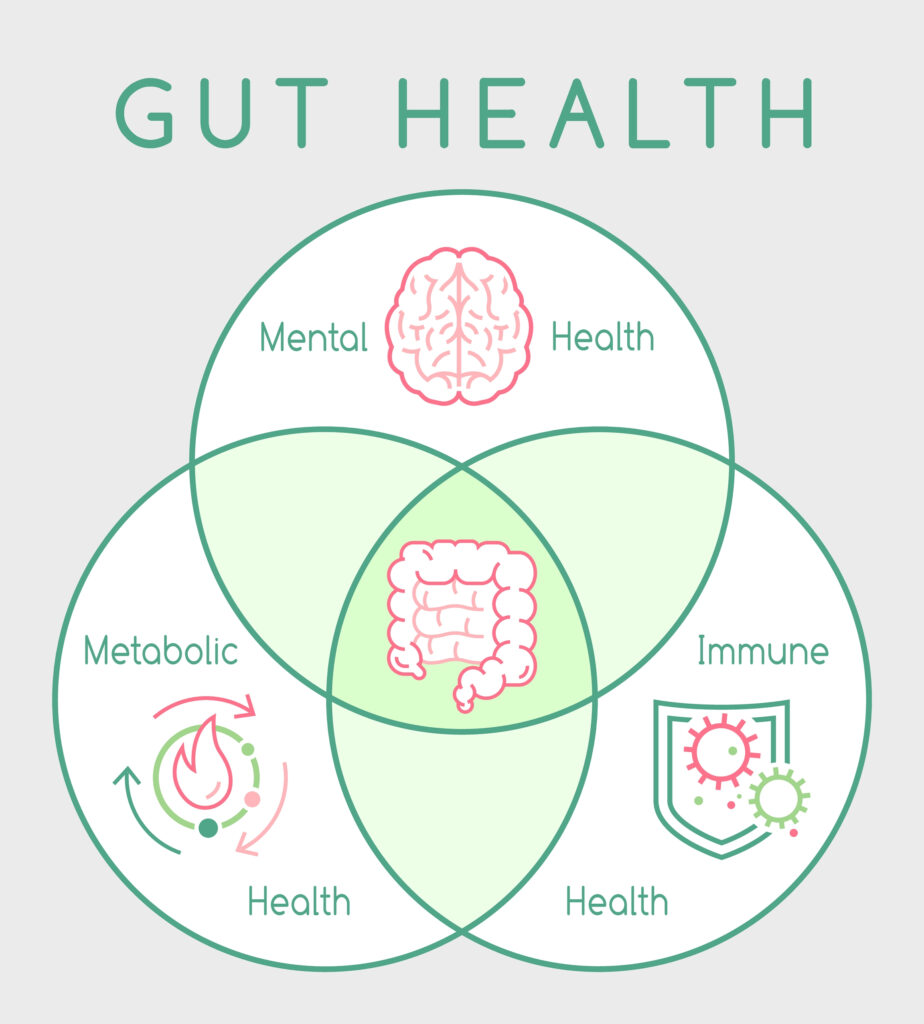April’s Stress Awareness Month served as an opportune moment to delve into strategies for navigating stress and its repercussions on our health. Stress doesn’t just affect our mental state—it profoundly influences our physical well-being, particularly the delicate balance of our digestive system and immune health. And, recognizing and understanding the gut-brain connection is crucial for addressing both the psychological and physiological aspects of stress-related gut issues.

Let’s explore how stress can affect the gut and our overall health a little more…
The gut-brain axis serves as a vital communication pathway between your emotional and cognitive centers, and your digestive system. “When stress disrupts the gut-brain connection, it can manifest in various gastrointestinal issues such as upset stomach, bloating or diarrhea. Stress triggers the release of hormones that influence gut motility and sensitivity,” says Dr. Harry Oken, Internist and Scientific Advisor to PanTheryx, parent company to TruBiotics and Life’s First Naturals. “Unfortunately, not many people know that stress can alter the composition and function of the gut microbiota, further impacting digestive health.”
In fact, research has illuminated the mechanism through which stress can heighten gut barrier permeability, leading to what’s known as a ‘leaky gut.’ “A leaky gut compromises the integrity of the intestinal barrier, allowing harmful bacteria or toxins to infiltrate the bloodstream, potentially contributing to different gut health concerns and more,” according to Dr. Oken.
To help address the gut’s permeability, dietary adjustments and adding stress-reduction techniques into one’s wellness regimen can be immensely beneficial in maintaining the gut’s barrier. For example, some supplements, such as bovine colostrum, the first milk produced by cows after giving birth, has been found to help maintain the gut lining if taken regularly.
Dr. Michael Roizen, Chief Wellness Officer Emeritus at the Cleveland Clinic and Scientific Advisor to PanTheryx, parent company to TruBiotics and Life’s First Naturals says, “Bovine colostrum contains bioactive molecules that help reinforce the gut barrier, reducing permeability and enhancing overall gastrointestinal health. By supplementing with bovine colostrum, individuals can support their body’s natural defenses against stress-induced gut imbalance.”
Another great supplement to think about incorporating is a science-backed probiotic supplement, like TruBiotics. Probiotic supplements contain beneficial microorganisms that, when consumed regularly, present health benefits. These benefits can include restoring gut microbiota that stress can often disrupt and modulating immune responses, as the gut is a significant site of immune activity and stress can dysregulate immune responses.
Alongside dietary modifications and supplementation, engaging in regular (but not extreme) exercise remains a cornerstone in promoting gut health and managing stress levels. Activities such as mild jogging, brisk walking, or yoga not only enhance physical well-being but also regulate digestion and alleviate stress.
“Exercise serves as a potent stress reliever, stimulating the release of endorphins—the body’s natural mood elevators,” Dr. Roizen affirms. “This, in turn, can counteract the negative impact of stress on gut health, fostering a harmonious balance between mind and body.”
Furthermore, incorporating mindfulness practices such as meditation and deep breathing exercises into daily routines can profoundly benefit gut health by calming the nervous system and mitigating stress responses. “Incorporating even a few minutes of meditation or deep breathing exercises can yield significant improvements in gut bacteria, gut barrier function, and reducing inflammation,” said Dr. Roizen.
So, if you feel stressed out just thinking about what to do, start with something that is manageable. All of the above strategies can help support digestive wellness, and every little step can help empower us to cultivate a healthier, more resilient body and mind.